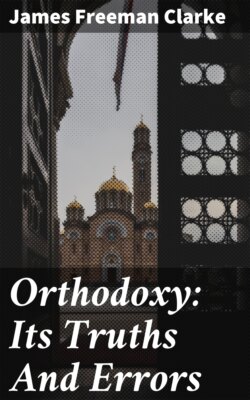Читать книгу Orthodoxy: Its Truths And Errors - James Freeman Clarke - Страница 8
На сайте Литреса книга снята с продажи.
§ 5. The Doctrine of Essentials and Non-essentials leads to Rome.
ОглавлениеTable of Contents
If Orthodoxy consists in a statement of opinions the belief of which is essential to salvation, the question arises, Are all these opinions essential, or only a part? It is generally admitted that the great system called Orthodoxy contains some things not essential to salvation. How shall these be distinguished? Moreover, some variation of statement is judged allowable. No Orthodox creed is assumed to be inspired as to its language. The same essential truth may be expressed in different terms. How, then, are we to define the limits of expression so as to know what error of opinion is venial, and what vital? Orthodoxy assures us that our salvation depends on accepting its statements. In which particular form, then, must we accept them? In so important a matter as this, where salvation is assumed to depend on accepting the right form of doctrine, one surely ought to be able to know which the right form is. Now, the rule of Orthodoxy, as given above, is, that nothing is Orthodox, as essential doctrine, which has not been believed “always, everywhere, and by all.” But this raises an historical question, and one of no little difficulty. For since heresies have always existed, and some one has always been found somewhere to deny the most essential doctrines of Orthodoxy, the question is somewhat intricate who these “all” are who have never disbelieved the Orthodox system. It is plain that the majority of Christians have neither time nor ability for these investigations. The historical inquiry must be conducted for them by others. And here seems to come [pg 023] in the law of Church authority as against private judgment. And so the principle of Orthodoxy, carried out to its legitimate results, appears to land us at last in the Roman Catholic Church, to set aside the right of private judgment, and to justify intolerance and the forcible suppression of heresy. But as these results are not accepted by those who yet accept the principles of Orthodoxy, it is necessary to see if there is a fallacy anywhere in our course of thought, and at what precise point the fallacy has come in.
